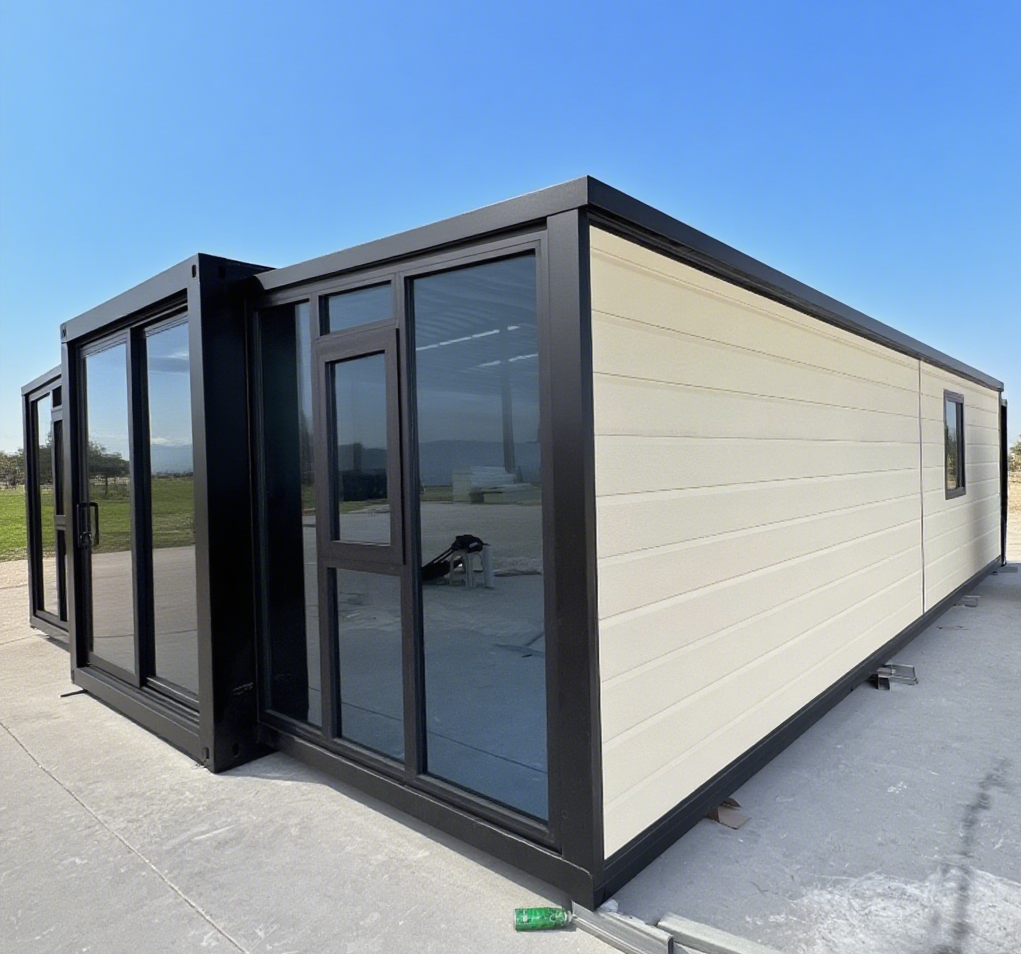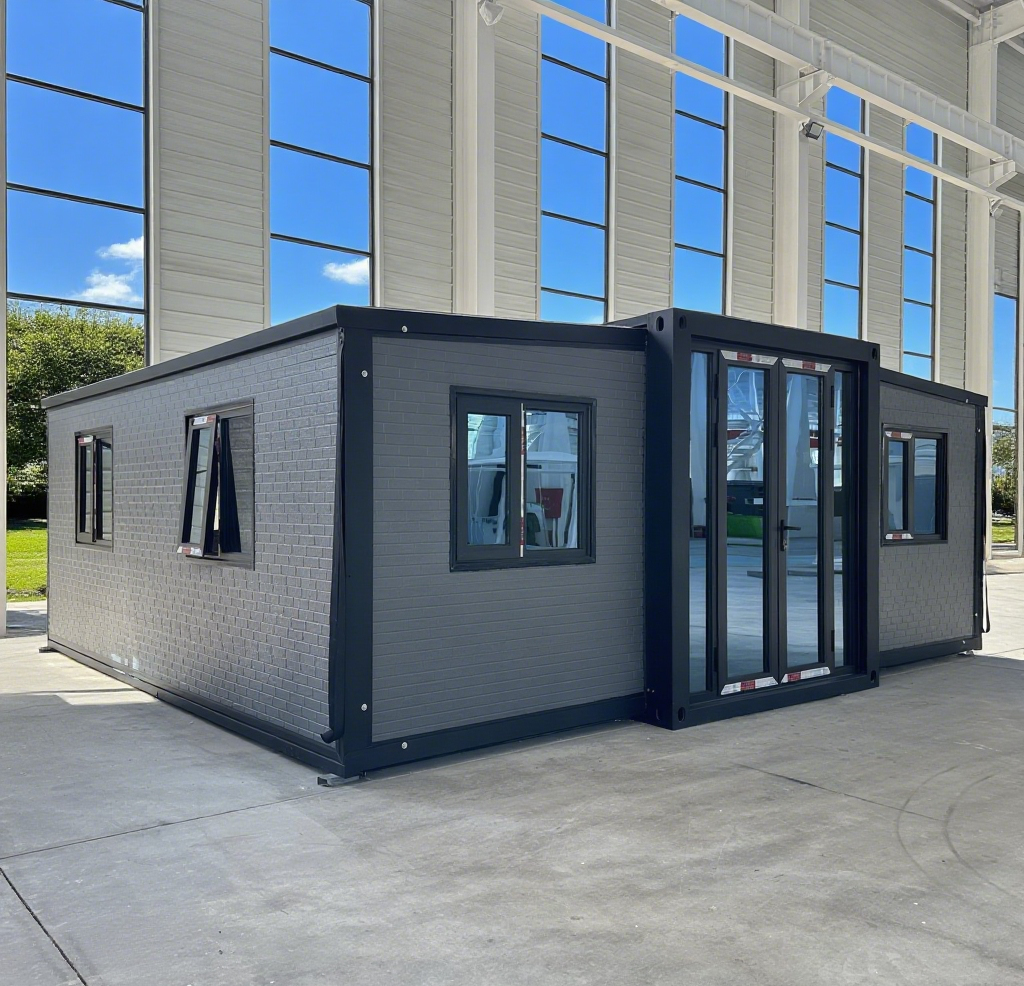Modern Taşınabilir Konut Çözümlerinin Çevresel Etkisi
Konut sektörü, katlanır konteyner evleri olarak yenilikçi ve potansiyel olarak çevre bilincine sahip bir yaşam çözümünün ortaya çıkışıyla dikkate değer bir dönüşüm yaşıyor. Bu çok yönlü yapılar, sürdürülebilir konut yaklaşımımızda önemli bir değişimi temsil eder ve pratikliği çevre sorumluluğuyla birleştirir. Kentsel alanlar genişlerken ve çevresel endişeler artarken, katlanır konteyner evler çevre bilincine sahip ev sahiplerinin ve geliştiricilerin ilgisini çekmeyi başarmıştır.
Katlanabilir konteyner evlerin kavramı, hem konut fiyatlandırılabilirliği hem de çevresel sürdürülebilirlik ihtiyacını karşılamak amacıyla ortaya çıkmıştır. Bu akıllıca yapılar, taşıma ve montajı olağanüstü verimli hale getiren katlanabilir unsurları bünyesine alarak temel konteyner tasarımını bir üst seviyeye taşır. Artan popülerlikleri, karbon ayak izini azaltma potansiyelleri ile rahat yaşam alanları sunarken kaynaklanmaktadır.
Malzeme Verimliliği ve Atık Azaltma
Sürdürülebilir İnşaat Malzemeleri
Katlanabilir konteyner evler inşaatlarında öncelikle geri dönüştürülmüş konteynerler ve çevre dostu malzemeler kullanılır. Bu yapılarda kullanılan çelik, yapısal bütünlüğünü kaybetmeden birden fazla kez geri dönüştürülebilir. Ayrıca, birçok üretici geri dönüştürülmüş kot veya yün gibi sürdürülebilir yalıtım malzemelerini de kullanarak çevresel etkiyi daha da azaltır.
Katlanabilir konteyner evlerin modüler yapısı, malzeme hesaplamalarının hassas yapılmasına olanak tanır ve inşaat atıklarını önemli ölçüde azaltır. Geleneksel inşaat yöntemlerinde fazla malzemelerin genellikle çöplüklere gönderildiği düşünülürse, bu evlerin prefabrik bileşenlerinin tam olarak belirlenmiş spesifikasyonlara göre üretilmesi, üretim sürecinin her aşamasında atıkları en aza indirir.
Yaşam Döngüsü Değerlendirmesi Avantajları
Yaşam döngüsü açısından değerlendirildiğinde, katlanabilir konteyner evler dikkat çekici çevresel avantajlar sunar. Aksi takdirde atılacak olan taşıma konteynerlerinin yeniden kullanılabilme imkanı, önemli bir çevre kazancı sağlar. Bu yapılar kolayca sökülebilir, taşınabilir ve yeniden monte edilebilir; böylece geleneksel binaların ötesinde kullanım ömürleri önemli ölçüde uzar.
Çelik konstrüksiyonun dayanıklılığı, bu evlerin doğru bakım ile onlarca yıl boyunca kullanılabileceği anlamına gelir. Nihayetinde kullanım ömürlerini tamamladıklarında, malzemeler tamamen geri dönüştürülebilir ve böylece çevresel etkiyi en aza indiren kapalı bir döngü sistemi oluşturulur.
Enerji Verimliliği Özellikleri
İleri Yalıtım Teknolojileri
Modern katlanabilir konteyner evler, enerji tüketimini önemli ölçüde azaltan son teknoloji yalıtım sistemlerini içerir. Kompakt tasarım, etkili sıcaklık kontrolüne olanak tanırken, özel kaplama malzemeleri güneş ışınımını yansıtarak iç mekânda rahat bir ortam sağlar. Birçok ünite, yapay ısıtma ve soğutmanın ihtiyacını en aza indiren çift camlı pencerelere ve stratejik havalandırma sistemlerine sahiptir.
Katlanabilir konteyner evlere entegre edilen akıllı ev teknolojileri, enerji verimliliğini daha da artırır. Otomatik iklim kontrol sistemleri, LED aydınlatma ve enerji izleme cihazları, kullanıcıların enerji tüketimini optimize etmelerine ve çevresel etkilerini azaltmalarına yardımcı olur.
Yenilenebilir enerji entegrasyonu
Katlanabilir konteyner evlerin düz çatı tasarımı, onları güneş paneli kurulumu için ideal hale getirir. Birçok üretici artık önceden yüklenmiş güneş sistemleri sunmakta veya yapılarını güneş enerjisine hazır olacak şekilde tasarlamaktadır. Yenilenebilir enerji kaynaklarının bu şekilde entegre edilmesi, geleneksel elektrik şebekelerine olan bağımlılığı önemli ölçüde azaltabilir veya tamamen ortadan kaldırabilir.
Bazı gelişmiş modeller yağmur suyu toplama sistemleri ve gri su geri dönüşüm yeteneklerini de içermektedir ve bu da çevresel etkilerini daha da azaltmaktadır. Bu su tasarrufu özellikleri, katlanabilir konteyner evleri özellikle şebeke dışı yaşam ve çevresel olarak hassas alanlar için son derece uygun hale getirir.

Taşımacılık ve Karbon Ayak İzi
Etkili Nakliye ve Montaj
Bu konteyner evlerin katlanabilir tasarımı, taşıma verimliliğini kökten değiştirir. Katlandıklarında, birden fazla birim tek bir kamyonla taşınabilir ve bu da geleneksel prefabrik evlere veya inşaat malzemelerine kıyasla yakıt tüketimini ve taşıma kaynaklı emisyonları önemli ölçüde azaltır.
Basitleştirilmiş montaj süreci minimum düzeyde ağır makine gerektirir ve genellikle geleneksel inşaata kıyasla gereken sürenin yalnızca bir kesriyle tamamlanabilir. Bu verimlilik, inşaat faaliyetleriyle ilişkili karbon emisyonlarını azaltır ve çevredeki ekosisteme olan etkiyi en aza indirir.
Alan Etkisi Azaltma
Katlanabilir konteyner evler kurulum alanlarına çok az etki eder. Hafif yapıları genellikle kapsamlı temel çalışmalarının yapılmasına gerek duymaz, bu da toprak bozulmasını azaltır ve yerel ekosistemlerin korunmasını sağlar. Bu yapıların kolayca taşınabilmesi, kalıcı çevre hasarı bırakmadan kaldırılabilmelerini mümkün kılar.
Kurulum alanı hazırlığına dair azaltılmış gereksinimler ayrıca sahada daha az ağır makine kullanımı ve daha az inşaat aracı bulunması anlamına gelir ve böylece kurulum sürecinin genel çevresel etkisini daha da düşürür.
Geleceğin Sürdürülebilirlik Eğilimleri
Yenilikçi Malzeme Geliştirme
Katlanabilir konteyner evlerin geleceği, yeni sürdürülebilir malzemeler üzerine yapılan araştırmalarla umut verici görünüyor. Üreticiler, geleneksel inşaat malzemelerinin yerine biyolojik temelli kompozitler, geri dönüştürülmüş plastikler ve diğer çevre dostu alternatifler üzerinde denemeler yapıyor. Bu yenilikler, bu yapıların çevresel etkisini daha da azaltmayı vaat ederken aynı zamanda performanslarını ve dayanıklılıklarını artırabilir.
Konteyner duvarlarının termal özelliklerini artırmak için gelişmiş kaplama teknolojileri geliştiriliyor ve bu sayede ek yalıtım malzemelerine olan ihtiyaç ortadan kalkabilir. Bu gelişmeler, katlanabilir konteyner evleri üretim maliyetlerini azaltırken aynı zamanda daha da çevre dostu hale getirebilir.
Dairelendir Ekonomi Entegrasyonu
Katlanabilir konteyner evlerin modüler yapısı, döngüsel ekonomi ilkeleriyle tamamen uyumludur. Üreticiler, malzemelerin mümkün olduğunca uzun süre kullanımda kalmasını sağlamak için bileşenlerin geri dönüşümü ve yenilenmesi konusunda yeni sistemler geliştiriyorlar. Bu yaklaşım, atıkları en aza indirir ve yeni ham madde talebini azaltır.
Gelecekteki tasarımlar, tüm yapıların değiştirilmesi yerine bireysel elemanların daha kolay yükseltilmesinin veya değiştirilmesinin yapılabilmesini sağlayan, daha kolay ayrılabilir bileşenleri içerebilir. Bu modülerlik, evlerin kullanım ömrünü uzatır ve uzun vadede çevresel etkisini azaltır.
Sıkça Sorulan Sorular
Katlanabilir konteyner evler genellikle ne kadar süre dayanır?
Uygun bakım ile katlanabilir konteyner evler 25-30 yıl veya daha fazla sürebilir. Çelik yapı oldukça dayanıklı ve hava koşullarına karşı dirençlidir ve modüler bileşenler binanın ömrünü uzatmak için ihtiyaç duyuldukça değiştirilebilir veya yükseltilebilir.
Katlanabilir konteyner evler tamamen şebekeye bağlı olmadan çalışabilir mi?
Evet, katlanabilir konteyner evler tamamen şebekeye bağımlı olmayan yaşam için tasarlanabilir. Güneş enerjisi sistemleri, yağmur suyu toplama ve verimli ısı yalıtımı ile bu evler geleneksel altyapı sistemlerine bağlı kalmadan modern konforu sürdürerek bağımsız olarak çalışabilir.
Katlanabilir konteyner evleri geleneksel evlere göre neden daha çevre dostudur?
Katlanabilir konteyner evler geri dönüştürülmüş malzemelerin kullanılması, verimli taşıma, minimum inşaat atığı, azaltılmış arazi etkisi ve düşük enerji tüketimi sayesinde üstün çevresel faydalar sunar. Modüler tasarımı ayrıca bileşenlerin kolayca güncellenmesine ve sonunda geri dönüşüm yapılabilmesine olanak tanır.
Katlanabilir konteyner evler aşırı hava koşullarına nasıl dayanıyor?
Modern katlanabilir konteyner evler, çeşitli hava koşullarına dayanacak şekilde tasarlanmıştır. Bu evler, aşırı sıcaklıklara, kuvvetli rüzgarlara ve yoğun yağışlara karşı koruma sağlayan takviyeli yapılar, hava koşullarına dirençli malzemeler ve gelişmiş yalıtım sistemleri sunar. Birçok model ayrıca şiddetli hava olayları için yerel inşaat kurallarına uymak üzere tasarlanmıştır.


